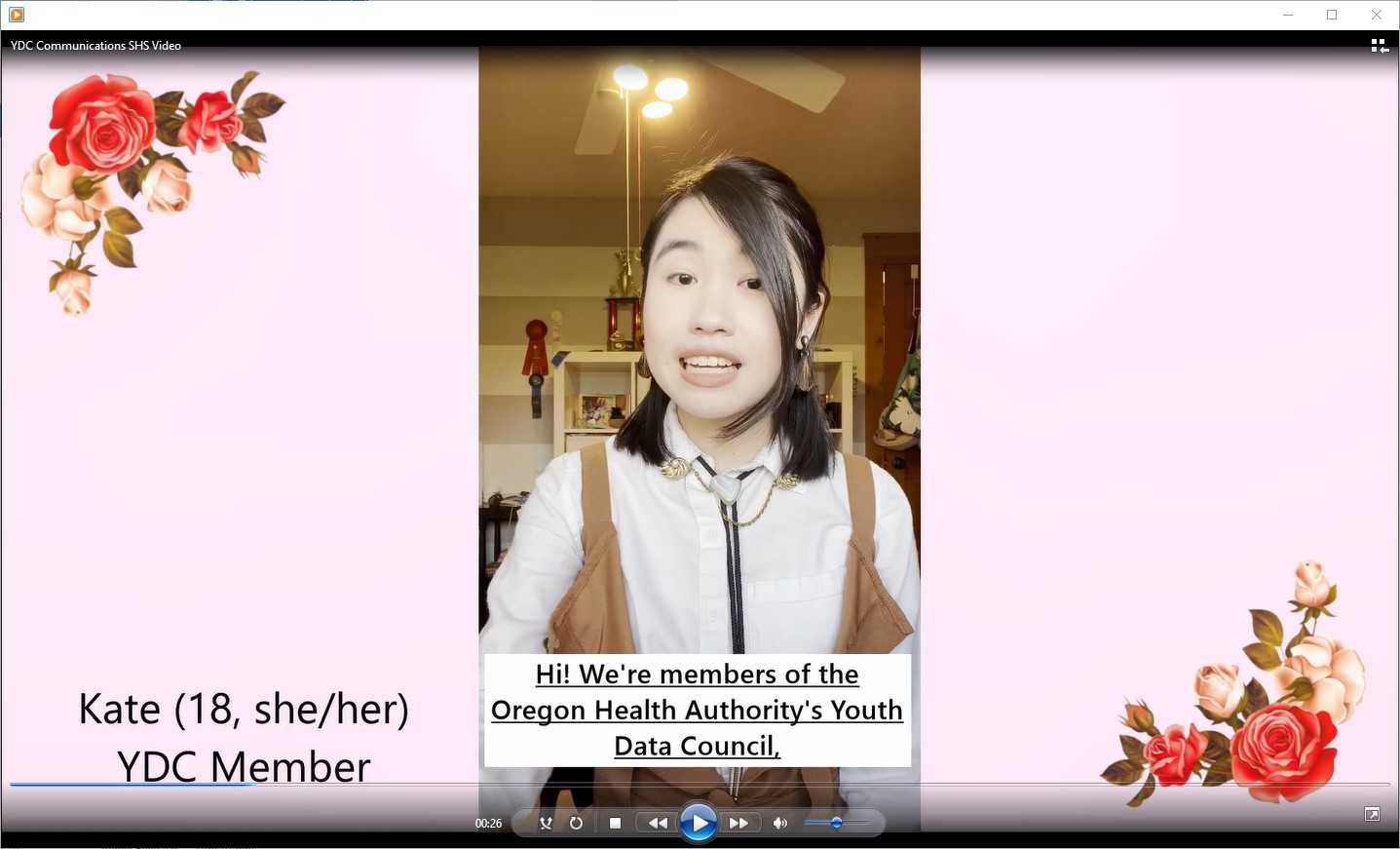What is the Youth Data Council?
The Youth Data Council (YDC) started in March 2022 as a way for young people to tell the Oregon Health Authority (OHA) Public Health Division and the Oregon Department of Education (ODE) how to improve the
Student Health Survey (SHS). The SHS is a survey that students take in the fall during class that asks questions about a range of topics that may or may not be relevant to youth and their lives. This is why we need the YDC – we want to make sure the SHS is focusing on topics and asking questions that are meaningful to students in Oregon schools!
What is the purpose of the Youth Data Council?
Students are taking the Student Health Survey (SHS), so it's important for students to be part of the process. YDC members help shape three parts of the survey process:
- Survey content: the types of questions that are being asked on the SHS,
- Data interpretation: how we make sense of the data and what it means, and
- Data use: how we talk about and use the survey.
We want the SHS to be a tool that helps all Oregon students get the support and services that students need to be successful. And we know that the survey needs to reflect the reality of students' lives so we get reliable and useful data for shaping policy and funding decisions.

What do YDC members do?
The YDC meets virtually as a full group once a month from November through April. Each Council member spends up to 8 hours a month on a mix of group meetings and independent work for the YDC. Council members spend their time on projects, going to meetings, and learning data and research skills.
YDC projects are focused on strengthening the SHS by bringing a youth perspective to the data collection and analysis. Members may have the chance to serve on statewide workgroups or committees as YDC representatives. Past YDC members have:
- recommended adding social media and climate change questions to the 2024 SHS
- brought together community and school district leaders for a Data Party
- created and piloted a questionnaire to get youth input on SHS topics.
How do YDC members benefit?
YDC members are compensated for sharing their time, knowledge, and experience with OHA and ODE. Council members commit up to 8 hours every month to YDC activities and receive $45 / hour as a stipend for their participation. Members can choose direct deposit to a bank account, or a gift card (note that OHA will require W-4 tax forms and a monthly time and activity report).
Have the chance to participate in skill-building activities for YDC and the Public Health Youth Advisory Council. These activities build on life skills and focus on data and research skills. This year, some of the planned skill-building activities include:
- Facilitation and team building
- Time management and calendar tips
- Public speaking
- Writing valid and reliable survey questions
- Key steps in cleaning big datasets
- Descriptive analysis of survey data
- Data visualization – the good, the bad & the ugly
Who are the YDC members?
Members don't need any special skills or training to be part of the Youth Data Council – experience in life is enough! We have YDC members with a wide variety of skills and interests to work together on projects and represent the YDC in committees and workgroups. YDC members are enthusiastic about sharing their stories, experiences, and ideas to improve the survey and want to partner with adults working in state systems and school districts. To give input on the SHS, YDC members:
- Are 15 to 20 years old, and
- Have been a student in a public school in Oregon.
We want the YDC to reflect the diversity of Oregon youth. The YDC prioritizes youth who have connections to their family, friends, and community, especially those who identify as:
- Tribal, Indigenous, American Indian, Alaska Native or urban Native
- Black or African American, Asian, Native Hawaiian, Pacific Islander, Latino/a/x, Middle Eastern or North African
- LGBTQ2SIA+
- Living with a disability
- Living in a remote area or far away from cities, suburban areas and towns
- Facing life and system challenges, such as housing instability, hunger, poverty, foster care or trauma
How would you, your organization or your school district like to engage with the YDC? Would you like to hear more about the YDC? Contact Kari Greene at kari.greene@odhsoha.oregon.gov or call 503-910-6681.